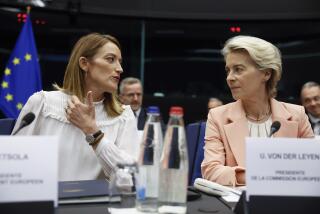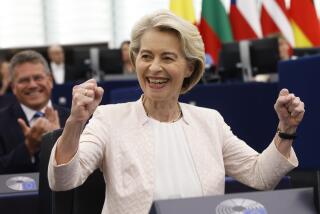Profile : ‘Good Shepherd’ Gathers E. European States to the Fold : As Council of Europe secretary general, Catherine Lalumiere works to bring former East Bloc members into her organization to help them smooth their transition to democracy.
- Share via
PARIS — Catherine Lalumiere is the “Good Shepherd” of Europe, gathering stray, former Communist nations of the defunct East Bloc into her growing flock.
Since becoming secretary general of the Council of Europe in May, 1989, in the midst of Eastern Europe’s dramatic political transformation, the tall, dark Lalumiere, 55, has devoted much of her time to overseeing the gradual absorption of those nations into the Continent’s oldest international political institution.
Recently, Czechoslovakia became the second East European country to join the council, which was founded in 1949 and dedicated to defending the principles of democracy and human rights on the Continent. Hungary was the first onetime Soviet satellite to join the organization, and Poland is expected to become a member later this year.
“I think, in a nutshell, what we are trying to do is turn the council into a Pan-European organization,” said Lalumiere in an interview during an official visit here. “And we are bringing in those from Eastern Europe because they urgently need a structure capable of accommodating them and assisting them to democratic reform.”
It’s a gradual process, Lalumiere explained. “They are first received as special guests to our meetings,” she said. “Then as participants in ministerial conferences, and last, having adopted all the requirements for a democratic government that observes human rights, to full membership.”
The advantage of membership in the Council of Europe for an Eastern European nation, Lalumiere says, is that it provides a “seal of respectability”--proof that the member is a pluralist parliamentary democracy and therefore eligible for Western support and benefits.
Members of the Council of Europe, which is based in Strasbourg, France, represent 25 parliamentary democracies comprising more than 400 million people.
Its main objective is to defend the principles of democracy and human rights by creating conventions, or international treaties, which provide the basis for common legislation throughout Europe.
There are more than 135 of these conventions dealing with such issues as prevention of torture, anti-terrorism, social security, drug abuse, spectator violence, data protection, trans-border television and nature conservation.
Perhaps the most important contribution of the council is the European Convention on Human Rights. This provides for the protection of fundamental civil and political liberties. It also established effective legal machinery to guarantee these rights by allowing a member state or an individual citizen to bring a case against a nation. The cases are examined by the European Commission of Human Rights, which in turn may refer them to the European Court of Human Rights for a judgment.
The Court of Human Rights prefers to settle matters before a judgment, if possible. If not, it renders a decision, in some cases a kind of cease-and-desist order, in others a financial judgment, or an order to release a protesting prisoner from jail. The ultimate penalty against a state is expulsion from the Council of Europe.
The court has heard more than 15,000 cases from its members. In 1967, for example, Denmark, Norway, Sweden and the Netherlands charged Greece with human rights abuses. Greece was forced out of the council in 1970 but was readmitted after the overthrow of its military government in 1974.
In 1971, Ireland charged Britain with improper interrogation of Irish Republican Army suspects. The Irish protest was upheld, and London agreed to change its procedures.
The Court of Human Rights has no connection with the World Court in The Hague, which is a United Nations body that deals with disputes between states, ranging from territory to rights of passage.
The Council of Europe lives in the shadow of the 12-member European Community (EC), a separate organization with which it is sometimes confused. Contributing to the identity problem is the fact that the Council of Europe building in Strasbourg also houses the EC’s Parliament.
But the EC’s principal concern is European economic and political integration--not human rights. The 12-member EC has a separate legal body, the European Court of Justice in Luxembourg, that administers its rules and regulations.
As the Council of Europe’s secretary general, Lalumiere is the senior woman official in any international political organization. She presides over a secretariat of 900 European officials, who coordinate activities of its Parliamentary Assembly and its 120 intergovernmental committees, which devise the conventions.
The Parliamentary Assembly has no legislative power. As Lalumiere puts it, it is the “political conscience” of the council, a deliberative and consultative group. Its members are appointed by their governments, from among national legislatures. By contrast, European Parliament members, once appointed, are now directly elected from member countries.
“It has been a truly fascinating period in Europe,” Lalumiere said of her tenure. “The Eastern European countries have enormous needs for economic and financial support. They are turning toward the West. We have an equally enormous responsibility to help.”
Born into a brewing family in France’s Alsace, she graduated as a doctor of public law with a second diploma in political science and law history, and became a lecturer at the University of Bordeaux.
She married Bordeaux Prof. Pierre Lalumiere, joined the Socialist Party in 1973, and was enlisted into the policy-making team of Socialist leader Francois Mitterrand.
Lalumiere was elected to the French Parliament, joined the government as minister for consumer affairs, and then as a secretary for European affairs. She was appointed by the French government as a member of the Council of Europe’s Parliamentary Assembly, which subsequently elected her secretary general.
As to being a woman in public service, Lalumiere said: “I don’t feel any obstacles were put in my path. Indeed, I think I’m rather lucky in being given political responsibilities.
“In a few circumstances, I--like other women--noticed some male, anti-female reflex action. But this was not at the higher levels. If you give women positions of responsibility, they tend to do a good job. I think women are a great source of talent in Europe.”
Although the United States is not a member of the council, Lalumiere said that “we would very much like to see the Council of Europe develop ties with Washington and Canada.”
“The future of Europe is a matter of concern to the U.S., even indirectly, and vice versa,” she added. “Europe needs to know more about Americans. My wish is that Americans take the trouble to discover more about Europe.
“I know it is difficult for Californians, say, to worry about the problems of Europe. But we Europeans need American understanding.”
A Primer on the Council of Europe
The 25-member Council of Europe was founded in 1949. It was conceived as an instrument for promoting increased unity in Western Europe through discussion and, where appropriate, common action in the economic, social, cultural, scientific, legal and administrative areas, and in the protection of human rights. It’s principal organs are the Committee of Ministers, made up of all member states and the Parliamentary Assembly, a deliberative organ. At right, France’s Catherine Lalumiere, sectretary general of the Council of Europe.
Member nations are Austria, Belgium, Britain,Cyprus, Denmark, Finland, France, Germany, Greece, Iceland, Ireland, Liechtenstein, Luxembourg, Malta, Netherlands, Norway, Portugal, San Marino, Spain, Switzerland and Turkey.
Special Guests of the Parliamentary Assembly: Czechoslovakia, Hungary, Poland, Soviet Union, Yugoslavia.
Observer for Parliamentary Assembly: Israel. SOURCE: Political Handbook of the World, 1990
Biography
Name: Catherine Lalumiere
Title: Council of Europe secretary general. She presides over a secretariat of 900 European officials.
Age: 55
Nationality: French
Education: Graduated as a doctor of public law with a second diploma in political science and law history, and became a lecturer at the University of Bordeaux.
Family: Married to Bordeaux Prof. Pierre Lalumiere.
Quote: “In a few circumstances, I--like other women--noticed some male, anti-female reflex action. But this was not at the higher levels. If you give women positions of responsibility, they tend to do a good job. I think women are a great source of talent in Europe.”
More to Read
Sign up for Essential California
The most important California stories and recommendations in your inbox every morning.
You may occasionally receive promotional content from the Los Angeles Times.












